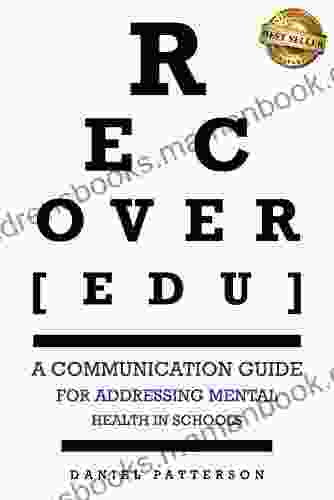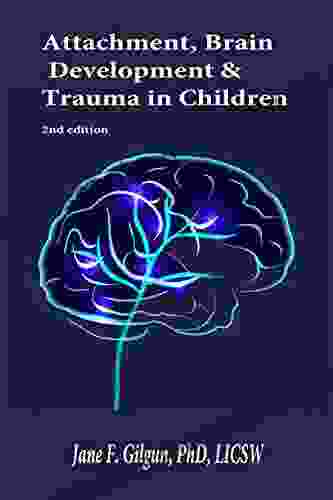Attachment, Brain Development, and Trauma in Children

Attachment, the deep emotional bond between a child and their primary caregivers, plays a crucial role in shaping brain development and overall well-being. Secure attachment relationships, characterized by consistency, responsiveness, and sensitivity, foster optimal brain development and emotional regulation.
4.2 out of 5
| Language | : | English |
| File size | : | 1126 KB |
| Text-to-Speech | : | Enabled |
| Enhanced typesetting | : | Enabled |
| Word Wise | : | Enabled |
| Print length | : | 16 pages |
| Lending | : | Enabled |
| Screen Reader | : | Supported |
In contrast, insecure attachment patterns, resulting from inconsistent or neglectful caregiving, can disrupt brain development and lead to behavioral and emotional problems. Childhood trauma, such as abuse, neglect, or witnessing violence, can have devastating effects on brain development, further exacerbating these challenges.
Attachment and Brain Development
During the first few years of life, the brain undergoes rapid growth and development, particularly in areas responsible for social-emotional functioning. Attachment relationships serve as a blueprint for these neural pathways, influencing how children perceive themselves and others, regulate their emotions, and form relationships throughout their lives.
Secure attachment promotes the development of strong neural connections in the prefrontal cortex, the area of the brain responsible for executive functioning, decision-making, and emotional control. It also strengthens connections in the amygdala, involved in processing emotions, and the hippocampus, essential for memory and learning.
Insecure attachment, on the other hand, can lead to disruptions in these neural pathways. Children with insecure attachment may have difficulty regulating their emotions, forming healthy relationships, and coping with stress.
Childhood Trauma and Brain Development
Childhood trauma can profoundly impact brain development, particularly in the areas responsible for emotional processing, memory, and self-regulation. Exposure to trauma can disrupt the formation of neural pathways, leading to problems with attention, learning, and behavior.
Trauma can also affect the development of the hippocampus, impairing memory and learning. Additionally, it can activate the amygdala, making children more sensitive to perceived threats and less able to regulate their responses.
Implications for Child Development
Secure attachment relationships promote healthy brain development and overall well-being in children. They provide a foundation for emotional security, self-esteem, and social competence. Insecure attachment patterns and childhood trauma can disrupt these developmental processes, leading to a range of behavioral and emotional problems.
Children with insecure attachment may experience difficulty forming relationships, managing their emotions, and coping with stress. They may be more prone to anxiety, depression, and substance abuse.
Children who have experienced trauma may have difficulty forming secure attachments, regulating their emotions, and controlling their behavior. They may also experience problems with attention, learning, and memory.
Trauma-Informed Care
Understanding the impact of trauma on brain development is crucial for providing effective care to children who have experienced adversity. Trauma-informed care involves recognizing the potential impact of trauma on children's behavior and emotional well-being.
Trauma-informed practitioners create safe and supportive environments where children can feel safe to share their experiences and receive the necessary support. They use evidence-based practices that focus on building resilience, promoting self-regulation, and fostering healthy attachment relationships.
Attachment, brain development, and trauma are intricately linked processes that profoundly shape a child's development. Secure attachment relationships promote healthy brain development and overall well-being, while insecure attachment patterns and childhood trauma can disrupt these processes and lead to a range of behavioral and emotional problems.
By understanding these connections, we can foster healthy attachment relationships and provide trauma-informed care to promote optimal child development. This involves creating safe and supportive environments, using evidence-based practices, and working in partnership with families and communities to support children's recovery and resilience.
4.2 out of 5
| Language | : | English |
| File size | : | 1126 KB |
| Text-to-Speech | : | Enabled |
| Enhanced typesetting | : | Enabled |
| Word Wise | : | Enabled |
| Print length | : | 16 pages |
| Lending | : | Enabled |
| Screen Reader | : | Supported |
Do you want to contribute by writing guest posts on this blog?
Please contact us and send us a resume of previous articles that you have written.
 Top Book
Top Book Novel
Novel Fiction
Fiction Nonfiction
Nonfiction Literature
Literature Paperback
Paperback Hardcover
Hardcover E-book
E-book Audiobook
Audiobook Bestseller
Bestseller Classic
Classic Mystery
Mystery Thriller
Thriller Romance
Romance Fantasy
Fantasy Science Fiction
Science Fiction Biography
Biography Memoir
Memoir Autobiography
Autobiography Poetry
Poetry Drama
Drama Historical Fiction
Historical Fiction Self-help
Self-help Young Adult
Young Adult Childrens Books
Childrens Books Graphic Novel
Graphic Novel Anthology
Anthology Series
Series Encyclopedia
Encyclopedia Reference
Reference Guidebook
Guidebook Textbook
Textbook Workbook
Workbook Journal
Journal Diary
Diary Manuscript
Manuscript Folio
Folio Pulp Fiction
Pulp Fiction Short Stories
Short Stories Fairy Tales
Fairy Tales Fables
Fables Mythology
Mythology Philosophy
Philosophy Religion
Religion Spirituality
Spirituality Essays
Essays Critique
Critique Commentary
Commentary Glossary
Glossary Bibliography
Bibliography Index
Index Table of Contents
Table of Contents Preface
Preface Introduction
Introduction Foreword
Foreword Afterword
Afterword Appendices
Appendices Annotations
Annotations Footnotes
Footnotes Epilogue
Epilogue Prologue
Prologue James Mcgrath Morris
James Mcgrath Morris Tom Furniss
Tom Furniss Bob Sorge
Bob Sorge David Dubrow
David Dubrow Joan Lee
Joan Lee John Norman
John Norman S L Turner
S L Turner Peter Hathaway Capstick
Peter Hathaway Capstick Florence Nightingale
Florence Nightingale Anne Marie Meyer
Anne Marie Meyer Cadwallader Colden
Cadwallader Colden C W Lemoine
C W Lemoine Susan Windle
Susan Windle Eyone Williams
Eyone Williams Mito Bessalel
Mito Bessalel Bernie S Siegel Md
Bernie S Siegel Md Thomas K Lutz
Thomas K Lutz Joanna Farrow
Joanna Farrow Suzanne Ferriss
Suzanne Ferriss Edna O Brien
Edna O Brien
Light bulbAdvertise smarter! Our strategic ad space ensures maximum exposure. Reserve your spot today!

 Drew BellThe Black Entrepreneur Report: A Comprehensive Analysis of the State of Black...
Drew BellThe Black Entrepreneur Report: A Comprehensive Analysis of the State of Black...
 Benjamin StoneThe Sisters of Serapis: Unraveling the Enchanting Tale of Courage, Betrayal,...
Benjamin StoneThe Sisters of Serapis: Unraveling the Enchanting Tale of Courage, Betrayal,...
 J.R.R. TolkienA Comprehensive Guide to Addressing Mental Health in Schools: Open Dialogue,...
J.R.R. TolkienA Comprehensive Guide to Addressing Mental Health in Schools: Open Dialogue,... Alan TurnerFollow ·11.2k
Alan TurnerFollow ·11.2k Connor MitchellFollow ·3.8k
Connor MitchellFollow ·3.8k Douglas FosterFollow ·10.8k
Douglas FosterFollow ·10.8k Robert HeinleinFollow ·7.6k
Robert HeinleinFollow ·7.6k Lucas ReedFollow ·10.4k
Lucas ReedFollow ·10.4k John Dos PassosFollow ·11.8k
John Dos PassosFollow ·11.8k Hugh ReedFollow ·17.8k
Hugh ReedFollow ·17.8k Ian MitchellFollow ·19.7k
Ian MitchellFollow ·19.7k

 Tom Clancy
Tom ClancyReading Wellness: Lessons in Independence and Proficiency
Reading is a fundamental skill that can...

 Brody Powell
Brody PowellHow Global Currencies Work: A Comprehensive Guide to...
Overview of...

 Dwight Bell
Dwight BellDune by Frank Herbert: An Epic Space Opera That Explores...
Dune by Frank...

 Ronald Simmons
Ronald SimmonsAn Anthology of Early Plays (1858-1938): A Journey into...
: Uncovering...

 Dominic Simmons
Dominic SimmonsCulture in the Ancient World: A Comprehensive Exploration...
Culture is a complex and multifaceted concept...
4.2 out of 5
| Language | : | English |
| File size | : | 1126 KB |
| Text-to-Speech | : | Enabled |
| Enhanced typesetting | : | Enabled |
| Word Wise | : | Enabled |
| Print length | : | 16 pages |
| Lending | : | Enabled |
| Screen Reader | : | Supported |








